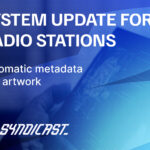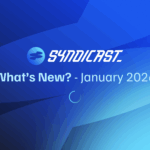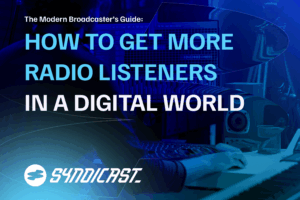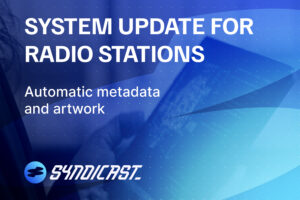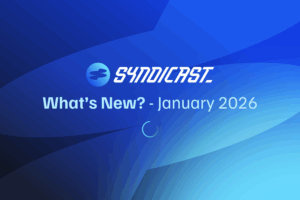In this article I am going to explain how radio syndication works in the case of electronic music programmes; who should use it and how those people can benefit from it.
Let’s start with the definition of radio syndication:
RADIO SYNDICATION IS THE DELIVERY OF A PARTICULAR RADIO PROGRAMME TO RADIO STATIONS OR NETWORKS WITH THE PURPOSE OF BROADCASTING IT.
Why should you syndicate your show?
The answer is simple, if you produce your show then why would you waste all your hard work by only making it available on Soundcloud or other streaming platforms? Let the world hear your sound, grow your show and reach as many people as possible around the world.
As we are talking about electronic music shows this means that DJs, producers, and even record labels could benefit the most out of syndicating your shows.
Radio show syndication is one of the best ways to promote yourself. Everybody likes to listen to music, so with a quality-produced programme you can attract and engage new listeners. You can feature your mixes and live sets. On top of this, if you speak during the programme the audience get to know your voice and as a result will get a more personalised experience. With jingles or with short talking segments you can promote yourself, your label, and much more.
What are the requirements for syndication?
The golden rule is that no station IDs, station names, dates, nor times of day should be mentioned.
Neither radio stations nor us consider “a mix” to be a radio show. So many artists and presenters record mixes and call them radio shows.
A SINGLE DJ MIX IS NOT A RADIO SHOW
Just think about this from the listener’s point of view: when you’re tuned in to a particular radio station and a good mix comes on, how do you know what you’re listening to? How can you find out more about the presenter if you like the music? Normally, there are jingles and/or speech to identify it. However, in a mix there are neither. So, both us and radio stations believe there must be either a talking segment or jingles or both..
I am sure I don’t need to mention that the show must be well-produced, without distortion. If you are talking in it, it has to be understandable.
There are thousands of radio shows and podcasts out there. Quality is essential.
But what else? From the radio station and listener’s point of view, weekly shows are the best. Radio stations can programme weekly shows easily and the listeners know that every week on the same day, at the same time your show is on.
Advantages of syndicating your show. How can you benefit from it?
Many years ago radio stations paid for syndicated content but it changed. Nowadays presenters are not getting paid/don’t get paid for their content but can definitely still benefit from it.
First of all, your show can reach countries you have never been to. Your music can be listened to by people whose ears you never thought it would come into contact with.
Secondly, as I mentioned, if you make the show why would you waste your efforts by publishing it exclusively on one platform ? Let’s reach more people with it. More radio stations means more listeners. Radio stations promote and broadcast your show in their territories and your sounds reach their audience. It results in a growing fan base and increased popularity.
Thirdly, radio stations promote the shows they broadcast so you benefit from this promotion and in-turn gain listeners. You can promote yourself, your label, releases etc, in the show either through speaking segments or through musical jingles. Either can name your website or social media handles.
Are you ready to syndicate your radio show?
How to syndicate your show?
There are two ways of syndicating your show. The first is the DIY way. You can do it yourself but be prepared: you are going to waste your time. You can Google radio stations and contact them one-by-one but they often only use trusted sources, so your email may never be answered. Not to mention the delivery: radio stations require the programmes in various formats, usually uploaded to their platforms. Therefore, it could be a very time consuming process. You also have to track which radio station is playing your show at what time as well as dealing with their various requests.

The second way is to use a distribution company like Syndicast. It offers an automated platform for distribution, where radio stations receive the shows in different formats via dashboard or FTP. Syndicast provides a real-time report of when and where your show will be aired, and deal with their requests.
DON’T FORGET: THE MORE RADIO STATIONS YOU HAVE, THE MORE WORK IS INVOLVED!.
It’s very important to understand syndication works. There are people who think that overnight a miracle happens and hundreds of radio stations will pick up their shows. If you have unrealistic expectations, the reality of the situation will bring you back down to earth with a bump.
One other very important thing to note is that it’s always the radio station that decides what they broadcast!
Syndication, just like radio shows, is a long-term project.
What kind of shows are radio stations looking for?
As I mentioned, undoubtedly the best format is the weekly one-hour format. There are of course bi-weekly, monthly, and 2-hour shows but they are usually less effective. Without a doubt, however, running a weekly 1 hour show involves lots of work.
There are thousands of radio shows and podcasts out there so you need to stand out somehow.
A presenter who is well-known can be an advantage. There is an endless debate about what is more important; fame of the presenter or quality of the content. Radio stations are different so it depends on what they prefer. Syndication works best alongside good PR. If you were able to create / generate a buzz about your show, that definitely would “sell it”.
2 interesting facts that you might not know:
- There are hundreds of radio stations around the world that broadcast electronic music programmes. (Syndicast alone, is partnered with over 650 radio stations as of 2017).
- Online radio stations should not be underestimated. Of course, online stations have a smaller reach but every listener counts and usually online radio stations can broadcast your show earlier than their FM or Satellite counterparts because these only review their schedules once or twice a year.
What can Syndicast do for your show?
Syndicast can build your show or podcast from scratch. Syndicast can produce your show, the jingles and any audio content, and we can even make mixes. If you syndicate your show via Syndicast with a single upload of the episode, not only will it be distributed to radio stations but it can be automatically published or scheduled on iTunes, Soundcloud, YouTube and Mixcloud. So why would you waste your time doing it by yourself?
Syndicast have built a large radio station community over the past few years with hundreds of radio stations on-board. All the radio stations play electronic dance music and the programme directors, station managers or decision makers use our system almost every single day.
Radio stations use mainly trusted sources to receive programming or music, so searching for and contacting them on your own is extremely difficult and very time consuming.
When you upload and submit your first show via the Syndicast Distribution System, an expert checks it and approves the show if it meets quality standards. When the show is approved the system automatically informs the radio stations or the decision makers at the radio stations about your show. So basically you don’t need to waste lots of time trying to reach out to the radio stations as we have them all in our system and we let them know about your show the second it’s approved.
It’s very important to know that it’s always the radio station’s decision when it comes to what they broadcast!
The Syndicast Distribution System doesn’t just inform the radio stations but features your show in the system. Stations can then subscribe to it at any time and start broadcasting it straight away.
When a radio station subscribes to your show, our system starts distributing the show to the radio in its required format and method (such as various bitrates, via FTP…). During the subscription process the radio station must provide the broadcasting details of your show such as airing date, time, frequency…. All these details appear in your dashboard in real-time.
Beside the delivery and syndication we deal with all incoming requests and issues from the radio stations regarding your show. New radio stations are continuously joining the Syndicast radio community so your chance of getting picked up by stations is growing every day.
Be patient! Subscriptions usually don’t come suddenly, especially if you aren’t (yet) world-famous. But we have good news for you, so many radio stations are looking for quality content instead of famous content creators! Many stations may not be ready to add your show today. They may be considering a format change, and quietly scouting around for syndicated programs. A music programme director may suddenly get handed the reins to a station, and be on the lookout for fresh shows. Sudden changes like these happen daily, and they mean opportunities for you.
We keep reminding the radio stations about your show and pushing it within the Syndicast Distribution System and if you’ve marketed your show well, then this, in addition to the syndication will increase your exposure leading stations to be more likely to add your show. Remember: people choose “products” that are familiar to them.



